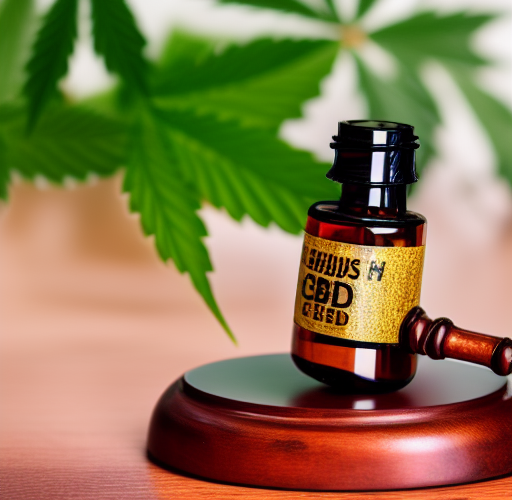Thinking about buying CBD oil, but worried about the legal implications of using it? The confusion of information about the legality of hemp products is so great that it can be difficult to get caught up in it all.
Fortunately, there are legal regulations that provide answers on a platter to all the questions we have. Is CBD oil legal in Poland and other European Union countries? In which countries should we be on guard, or give up using the product altogether? We dispel all doubts.
What is CBD oil?
With the goal of determining the legality of CBD oils, it is important to clarify in each country what CBD oils themselves are. Simply put, it is a product extracted from hemp seed (Cannabis sativa L) by isolating the cannabidiol purification and dissolving it in oil.
In the plant, the main compound is actually CBD. CBD oil is used by its users for various purposes. O CBD's effect on sleep and others benefits of CBD oil For health, read our other articles.
CBD can be an ingredient in dietary supplements, cosmetics and even products for children and pets. We have dedicated a separate post to CBD oils for dogs.
CBD vs. narcotic effects
Why do many people wonder if CBD is legal? The substance is obtained from hemp seed, which is mistakenly associated with marijuana, a drug not allowed in our country. However, we must remember that the stimulant is obtained from a different variety of plant: cannabis, which contains a large amount of a psychoactive substance called tetracannabidiol (THC).
It is the one that has narcotic effects, and the possession and cultivation of cannabis is strictly prohibited for this reason. CBD is extracted from hemp seed, which contains trace amounts of THC. As a result, the preparations most often do not exhibit narcotic effects.
Polish Law and CBD Oils
CBD oils in Poland are LEGAL. According to a decision by the Chief Sanitary Inspector issued on November 23, 2018. Fiber hemp can be used in the food industry if it has no THC or has THC in trace amounts, that is, less than 0.20%. The law, regarding CBD, is also regulated by the Anti-Drug Law of July 29, 2005, which was amended this year. On May 7, 2022, the amount of THC that a CBD product can have, i.e. less than 0.3%, was increased.
Cultivation of hemp seed in Poland
To produce CBD, certain criteria must be met. Article 63 of the Anti-Drug Addiction Law indicates that the cultivation and harvesting of hemp seed (cannabis sativa) are not subject to punishment, but must take place in accordance with Polish agricultural law. In addition, if hemp oil is to be registered as a drinkable medicinal product, it must be reported to the Chief Sanitary Inspectorate (GIS).
CBD oil and Polish law
The use and distribution of products containing CBD is in compliance with Polish law, as long as they do not contain more than 0.3% of THC in their composition (the regulation was introduced on May 7, 2022, previously up to 0.2% of tetrahydrocannabinol was allowed).
If the condition is met, you don't have to worry about having this type of preparation - it is completely legal in our country.
How much CBD can you carry?
In fact, there are no restrictions on this topic, and each of us can legally possess as much product as we want (as long as the THC concentration does not exceed 0.3%).
What is illegal in Poland?
CBD oil, however, must not be confused with RSO (Rick Simpson Oil), or cannabis flower extract. Popular among fascinators, the preparation contains a very high concentration of THC, and its possession is completely prohibited in Poland. Violations carry a penalty of up to 10 years in prison.
Medical marijuana
However, it is worth mentioning in passing that since November 2017, the use of medical marijuana has been allowed in our country. It can be purchased in selected pharmacies, based on prescriptions issued by doctors.
CBD oil vs THC test
Can consuming CBD oil affect the result of a test for THC in the body? Mostly not, so if you are taking the product in the recommended amounts and will be tested in the near future, you don't need to worry. The THC content of CBD products is so low that in most cases it will not have any representation in the test results.
However, if you've been consuming high CBD oil for an extended period of time, it's best to lay off the oil a few weeks before the scheduled test. In extremely rare situations, it happens that tests are positive.
Legality of CBD oils in other countries of the world
Production and possession of CBD oil are permitted in most European Union countries, as well as in many countries outside the community. However, each has its own regulations, which most often relate to the allowable concentration of THC in the preparations. CBD products can be used if they contain:
- THC < 1% - Czech Republic, Switzerland, Mexico, Argentina, Peru, Belize,
- THC < 0.3% - France, Luxembourg, Georgia, Cyprus, the United States (in the case of the US, however, it is also worth checking regulations at the federal level),
- THC < 0.2% - Germany, UK, Spain, Hungary, Croatia, South Africa, Thailand, Slovakia, Romania, Slovenia, Latvia, Estonia,
- THC 0% - Southern Ireland, Norway, Sweden, Japan, Israel, Hong Kong, Ukraine , Georgia.
CBD in the European Union
According to European Union law (as indicated by GIS itself), a product containing CBD in its formulation must be approved by the European Commission under the "novel foods" law. This is important for CBD manufacturers and stores that sell cosmetics or CBD oils.
The regulation of novel foods (i.e. foods that were not introduced before May 15, 1997) has had its place in European law since January 1, 2018 through Regulation 2015/2283 of the European Parliament and the Council of the European Union of November 25, 2018. More specifically, the introduction of novel foods is mentioned in Article 6.2
Only such novel foods that are authorized and included in the Union list may be marketed in the Union as such or used in or on foods in accordance with the conditions of use and labeling requirements of the list.
In addition, the Court of Justice of the European Union on November 19, 2020 ruled that:
Nevertheless, the national court should evaluate the available scientific data to ensure that the claimed real risk to public health does not turn out to be based on purely hypothetical assumptions. Indeed, a ban on the sale of CBD, which is, moreover, the most restrictive obstacle to exchange concerning a product lawfully produced and sold in other Member States, can only be adopted if that risk proves sufficiently demonstrated.
What are the implications of this? The state cannot prohibit the sale of CBD if there is no concrete scientific evidence regarding the fact that it will harm the public in terms of health. It is also worth noting that throughout the ruling, he indicated that the state cannot prohibit the sale of CBD if it is derived from the hemp plant Cannabis sativa L.
To sum up, it is possible to buy CBD oils in any European Union member state if it meets all the requirements for new foods. Given these facts - in Poland, too, having CBD oils is a legal.
CBD in America and Australia
When it comes to United States, CBD regulations have been created by the Drug Enforcment Agency (DEA), which state that, CBD products are legal when they have less than 0.30% THC in the formulation.
This is 0.10% more than in Germany what follows - US law is a bit more liberal. An analogous concentration to that in the US is allowed in Poland. On the other hand, it's not so simple, because the law in the States is governed by a great many state laws. In this case, it is also worth checking the law in your state.
Continuing on the topic of CBD in North American countries, consider the following Canada. As of October 17, 2018, CBD and marijuana are fully legal, however, the legislature, has established many aspects, making it difficult to obtain these products in regular stores.
Law in Australia, says CBD is a specialty product, making it necessary to have a prescription from a doctor to buy the product itself, and CBD itself cannot have THC more than 0.05%. The same is true for New Zealand, where CBD has been legal since the 1980s, but only available by prescription.
Where is CBD illegal?
If we don't want to break the law, we must completely refrain from using CBD products while in Russia, Belarus, Turkey, Egypt and Guatemala, among others.
In countries such as New Zealand, Belgium, Denmark, and Finland, possession of oils is allowed only for medical recommendations, and preparations are only available by prescription.
In which countries is CBD illegal?
Given that many citizens of the European Union travel carrying CBD oils or other products containing the substance, it is worth citing countries where the law differs from the European one or bans the possession of CBD products altogether.
- Countries that ban possession of CBD - Bosnia and Herzegovina, Russia, Belarus, Slovakia, Albania, Serbia, Egypt, Guatemala
- Countries where CBD is legal, but only by prescription: Belgium, Portugal, Denmark, Finland.
The laws of individual countries, are also regulated in such a way that CBD cannot have THC at all if it is to be allowed on the market. Such countries include Georgia, Norway and Sweden, for example.
On the other hand, countries where it is unclear to have a CBD, meaning the services may or may not draw consequences, are Egypt, Israel, Turkey.

